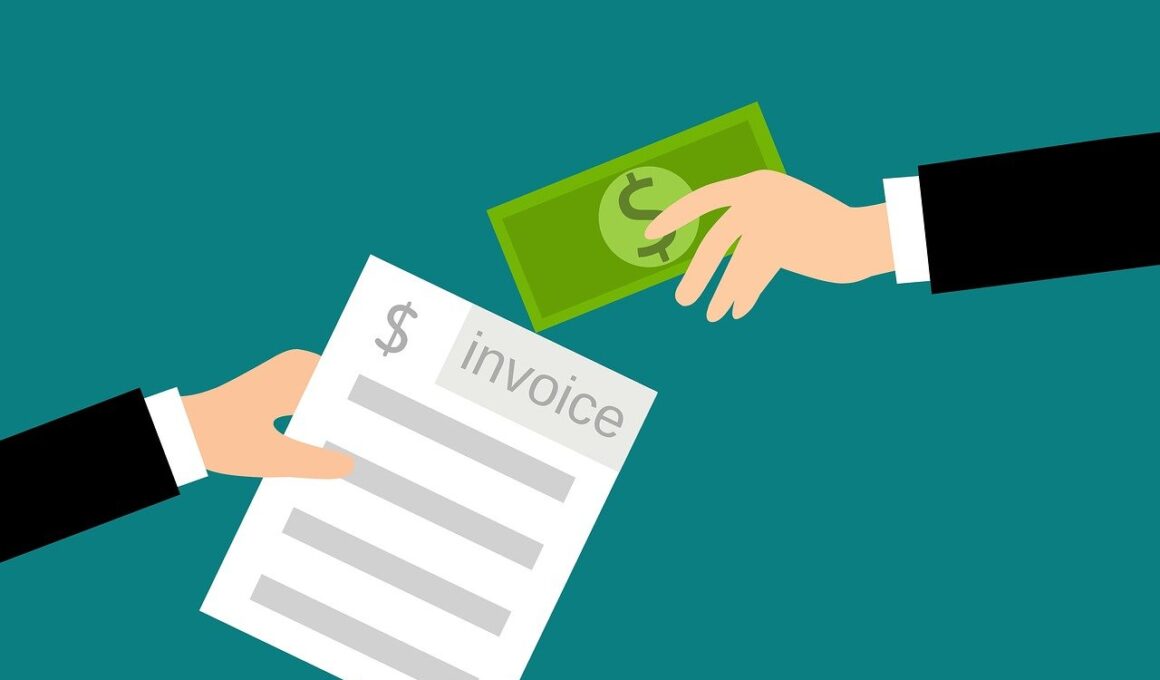How Invoice Financing Affects Your Business’s Credit Rating
Invoice financing is an innovative way for businesses to access immediate cash flow by using their outstanding invoices as collateral. It allows companies to receive funds quickly without waiting for their clients to settle their invoices. This process can greatly enhance a business’s liquidity, enabling it to meet operational costs or invest in growth opportunities. However, while it provides immediate cash flow, the use of invoice financing can also influence a business’s credit rating. When a company uses invoice financing, the lender assesses the creditworthiness of its customer rather than the business itself. Thus, if the customers have a strong credit profile, this can positively impact the business’s credit rating. However, if the customers have a poor credit rating, it could negatively influence the business’s perceived risk. It’s crucial for businesses to consider their customers’ credit profiles before entering into an invoice financing agreement. This financial tool can be beneficial, but understanding the related credit implications is vital for informed decision-making.
The Dual Impact on Credit Ratings
Utilizing invoice financing can have a dual impact on a business’s credit rating, presenting both advantages and disadvantages. On one hand, if businesses consistently obtain funds through this method, they can maintain a steady cash flow, helping them meet their financial obligations. Meeting payment deadlines can enhance the business’s credit rating as it establishes a consistent repayment history, showcasing reliability to lenders. Conversely, relying heavily on invoice financing could signal financial instability, especially if it becomes a primary means of operating cash. Lenders may perceive businesses that frequently resort to invoice financing as risky, which might lead to a lower credit rating. Moreover, the fees associated with invoice financing can be substantial, potentially increasing the operational costs of businesses. This could affect cash reserves negatively, further endangering their credit standing. Therefore, wise management of invoice financing is crucial for balancing immediate financial needs with long-term credit health. Understanding how this financing method behaves in relation to credit ratings is vital for business planning.
The strategic use of invoice financing can provide various advantages that can lead to improved credit ratings over time. More specifically, it allows businesses to focus on growth and investment without being bogged down by cash flow issues. By ensuring that cash is readily available, companies can purchase inventory, hire additional staff, or invest in marketing campaigns, which can ultimately increase revenue. Increased revenue may lead to improved financial statements and ratios that credit agencies analyze for rating purposes. Importantly, businesses can strategically leverage improved operations to negotiate better terms with their suppliers, further enhancing liquidity. Furthermore, maintaining prompt payments on financed invoices can showcase financial responsibility to other lenders, prompting an overall better rating. However, it’s crucial for entrepreneurs to establish limits on how much financing they use, striking a balance between liquidity and sustainable growth. Long-term reliance on invoice financing without addressing underlying cash flow issues might backfire. Thus, incorporating invoice financing into a broader financial strategy is essential for maximizing its benefits for credit ratings.
Choosing the Right Invoice Financing Partner
The selection of a reliable invoice financing partner plays an instrumental role in how it affects a business’s credit rating. The right partner not only provides the necessary capital but also enhances credibility. Lenders evaluating businesses often assess their relationship with financing partners, focusing on reputation and transparency. Businesses must identify partners with a solid standing in the industry as it reflects positively on their risks. Working with established companies can provide reassurance to potential creditors, showcasing that the business follows reputable practices. Additionally, fees and terms associated with financing can vary significantly among different partners, impacting the overall cost of funds. Transparent terms can prevent hidden costs from cropping up, affecting financial states and credit ratings. Seeking recommendations and thoroughly researching potential partners can ensure that a business secures favorable terms. A trustworthy funding source can enhance a company’s financial standing, improving its credit rating. Thus, choosing the right partner should be a priority alongside the practical goals of securing liquidity through invoice financing.
Monitoring cash flow is an essential practice for business owners considering invoice financing, as it contributes significantly to understanding credit rating implications. Business owners should regularly assess their cash flow projections and actual performance to identify any discrepancies. This disciplined approach allows them to avoid becoming overly reliant on external financing. If businesses find themselves using invoice financing too often or for extended periods, it may indicate persistent cash flow issues. Such problems could negatively impact their financial health in the eyes of credit rating agencies. Additionally, companies must maintain an organized invoicing system to avoid complications, ensuring that invoices are sent promptly and are paid in a timely manner. The ability to manage and predict cash flow effectively creates a stable financial environment, which is inherently appealing to credit agencies monitoring performance. Regular reviews help businesses mitigate risks associated with invoice financing and maintain healthy credit ratings. This ongoing attention to financial health is instrumental in creating a positive perception among creditors looking at past financial behavior.
Educating Employees on Financial Best Practices
Education plays a vital role in managing the effects of invoice financing on a business’s credit rating in today’s financial world. Implementing training programs for employees focused on financial management can provide substantial benefits. Educated employees are better equipped to understand the implications of cash flow, invoicing, and financing strategies. This awareness can lead to more stringent credit management practices, such as evaluating customer creditworthiness or negotiating favorable payment terms. Moreover, when employees understand the financial aspects of operations, they are more likely to contribute to improved efficiencies, potentially reducing the reliance on external financing. Teams that collaborate in managing finances effectively can lead to increased customer satisfaction as they ensure on-time payments and better service delivery. Ultimately, an educated workforce contributes to a more financially sound operation, promoting an overall culture of financial responsibility. Employees who comprehend the significance of these factors help branches of business operations align with long-term credit goals, creating a stronger foundation for sustainable growth.
Overall, invoice financing poses both risks and opportunities concerning a business’s credit rating. Understanding the dynamics of this financial tool allows business owners to leverage its advantages while actively managing related risks. Proper management of invoice financing can lead to better cash flow, which consequently enhances credit scores. Conversely, businesses need to proactively monitor their financing relationships and payment histories to avoid negative repercussions. Companies should regularly analyze how their financing affects long-term financial health, incorporating insights gained into strategic planning. Furthermore, cultivating strong customer relationships is essential. When businesses work with reliable clients, they mitigate risks tied to invoice financing while securing better financial terms in the long run. Existing debt obligations should be considered alongside new financial decisions, ensuring a balance that protects credit standing. Thus, education, structured planning, and strategic relationships become key pillars in utilizing invoice financing effectively. In essence, businesses can navigate this financing while prioritizing their credit ratings, creating financial strategies that align with sustainable growth and long-term success.
In conclusion, the relationship between invoice financing and a business’s credit rating is multifaceted. Understanding how to navigate invoice financing can lead to improved cash flow and opportunities for growth. Businesses that approach this tool with diligence and strategy are more likely to see positive impacts on their credit ratings. By maintaining good customer relationships, paying invoices timely, and choosing the right financing partners, companies can bolster their financial credibility. In this way, invoice financing can become not just a means of immediate cash access but also a strategic advantage in strengthening the overall credit health of a business. Businesses can make informed decisions regarding invoice financing, leading to robust financial strategies aimed at achieving long-term objectives. Monitoring financing relationships, educating employees, and consistently evaluating cash flow is essential for ongoing success. Ultimately, a proactive approach ensures businesses leverage invoice financing effectively without compromising their credit ratings. Thus, thorough research, understanding, and education remain crucial to successfully balancing immediate liquidity needs alongside maintaining strong creditworthiness.


